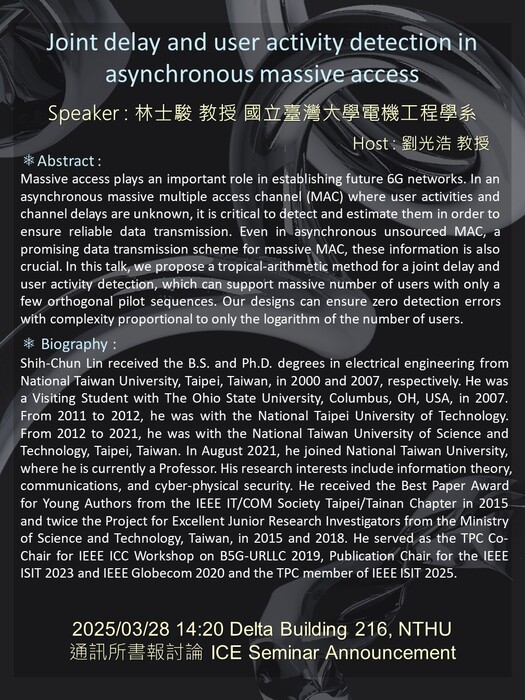2025/03/28(Fri.) 14:20 林士駿 教授 國立臺灣大學電機工程學系 - Joint delay and user activity detection in asynchronous massive access

Date & Time:
2025 /03 / 28 (Fri) 14:20 - 16:20
Location:
Delta Building R216, NTHU
Speaker:
林士駿 教授
國立臺灣大學電機工程學系
Topic:
Joint delay and user activity detection in asynchronous massive access
Abstract:
Massive access plays an important role in establishing future 6G networks. In an asynchronous massive multiple access channel (MAC) where user activities and channel delays are unknown, it is critical to detect and estimate them in order to ensure reliable data transmission. Even in asynchronous unsourced MAC, a promising data transmission scheme for massive MAC, these information is also crucial. In this talk, we propose a tropical-arithmetic method for a joint delay and user activity detection, which can support massive number of users with only a few orthogonal pilot sequences. Our designs can ensure zero detection errors with complexity proportional to only the logarithm of the number of users.
Autobiography:
Shih-Chun Lin received the B.S. and Ph.D. degrees in electrical engineering from National Taiwan University, Taipei, Taiwan, in 2000 and 2007, respectively. He was a Visiting Student with The Ohio State University, Columbus, OH, USA, in 2007. From 2011 to 2012, he was with the National Taipei University of Technology. From 2012 to 2021, he was with the National Taiwan University of Science and Technology, Taipei, Taiwan. In August 2021, he joined National Taiwan University, where he is currently a Professor. His research interests include information theory, communications, and cyber-physical security. He received the Best Paper Award for Young Authors from the IEEE IT/COM Society Taipei/Tainan Chapter in 2015 and twice the Project for Excellent Junior Research Investigators from the Ministry of Science and Technology, Taiwan, in 2015 and 2018. He served as the TPC Co-Chair for IEEE ICC Workshop on B5G-URLLC 2019, Publication Chair for the IEEE ISIT 2023 and IEEE Globecom 2020 and the TPC member of IEEE ISIT 2025.

